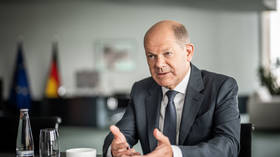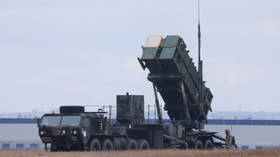German leader shares his thoughts on what Putin wants

Russian President Vladimir Putin desires a return to a 'spheres of influence' situation, but he will not succeed, German Chancellor Olaf Scholz has claimed in an interview with the newspaper Munchner Merkur.
Among other topics, Scholz was asked to comment on Russia’s claims that Western sanctions were preventing deliveries of Russian gas to Germany via the Nord Stream pipeline. Earlier on Monday, Kremlin spokesman Dmitry Peskov said that the pipeline’s turbines have to undergo maintenance, but because of the sanctions “the Europeans are not returning them.”
“This justification is not plausible,” Scholz responded.
In another part of the interview, while insisting that neither NATO nor the European Union has represented a threat to Russia, Scholz stressed that the Russian leader “has to accept that a community of democracies and constitutional states is growing ever closer together in his neighborhood.”
He wants a divided Europe and a return to a policy of spheres of influence. He won't be able to do that.
The term ‘spheres of influence’ is often being used in relation to the Cold War era when the two major superpowers, the United States and Soviet Union, exerted influence over different parts of the world.
Moscow has for many years been warning NATO against eastward expansion, viewing it as a direct threat to its security. The potential accession of Ukraine to the alliance was named by Russia as one of the reasons behind the launch of the special military operation in Ukraine.
Moscow recently revealed that it now considers the EU “an aggressive militant player,” which is merging with NATO and “has ambitions stretching far beyond the European continent.”
Scholz made it clear that Germany and its allies would continue to “hold out for as long as it takes” when it comes to supporting Ukraine and maintaining economic pressure on Russia, but without getting into direct military confrontation with Moscow.
In the chancellor’s opinion, Putin “seems afraid that the spark of democracy could spread to his country” and thus has been “pursuing a policy aimed at dissolving NATO and the EU.”
Responding to Scholz’s claim, Russian Foreign Ministry spokeswoman Maria Zakharova said: “A couple of times German sparks spread to us. We will not allow any more fires.”













